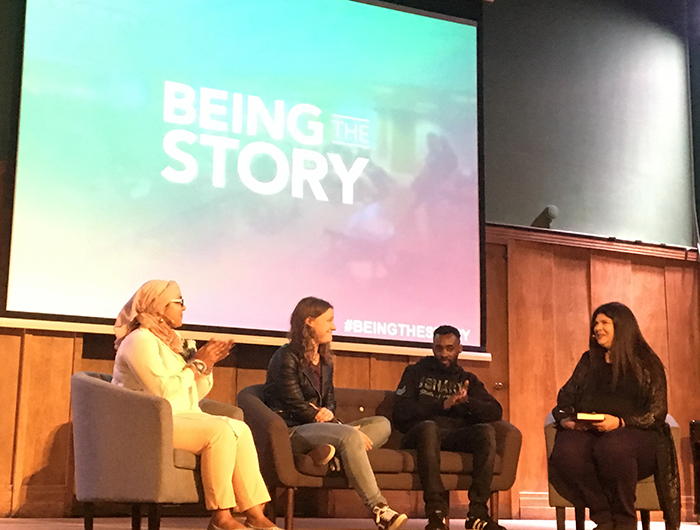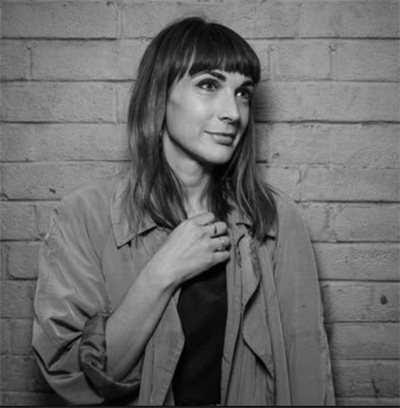Are you actually listening Mum – or just pretending?’
Oh dear. My children know the trick – ask a question – how was school? Then eyes glaze over, ears close off and my mind switches to a distracting work deadline.
Familiar? I can’t be the only one.
We all could do with a speed lesson in honing our listening skills. That’s a clear unexpected takeaway message from Being the Story 2018. For those of you don’t know the event, it’s the third from storytelling house, sounddelivery which gives people with firsthand experience of today’s pressing social issues the opportunity and platform to describe their lives in their own words and offer solutions for positive action. These are stories that matter. Stories that spell out the reality of poverty, injustice, prejudice, homelessness, addiction, crime, mental health, loneliness – in order to drive change for the future.
This year’s event reinforced the onus not just on storytellers to relay their experiences, but for those of us hearing their voices to listen and act. To help them spread the word beyond an echo chamber, into the media, to policy makers and those in positions of power.

‘Listen. We are only here because of what happened at Grenfell. Listen hard.’
Tower Block Residents group On Top of the World from Manchester performed part of a musical play which highlighted the perils of not listening. Can you Hear Me from Up Here? was created in the wake of the Grenfell Tower disaster. Not just a gesture of solidarity but a call to action after the high-rise residents of West London had been silenced over many years to the cost of more than 70 lives.
The Manchester group’s beautifully crafted poetry and song conveyed a complex message of anger and the ordinary, community and neglect. The subtext being that local authorities must listen to those most affected by policies. MPs, commissioners and funders too. In fact, all of us join a conspiracy of silence unless we listen better. Listening costs nothing. Not listening can cost lives.
And that means proper listening. Not just nodding and moving on. Nigerian-born Peter Atakpo works as a barber in South London. You might think he’d want to promote his on-trend cutting techniques. But no, Peter is proudest of his ability and willingness to listen to anyone in the chair. His clients include police officers, ex-prisoners, priests, imams. He caters for all – the man who confides he’s autistic and Rashad the Eton scholarship boy.
‘No matter who you’re talking to, it’s always important to listen. Togetherness and empathy is essential for the world. Lack of it leads to hate and division. If we have empathy we will at least be able to imagine. ‘
The barber should know. After leaving South Africa eight years ago amidst rising xenophobic tensions, Peter flies the flag for tolerant listening. He promotes active listening well beyond the barber’s shop. Not only can people walk in his shoes as part of a joint project with the Empathy Museum and Migration Museum, but also conversations in his salon have featured in the National Theatre’s play, Barber Shop Chronicles. Listening is fascinating, especially to those like me who are inherently nosy. But it needs practice and demands appropriate action. Change can only happen if the powers-that-be hear and decide to do something. I came away thinking Peter should have his own You-tube channel, feature in every newspaper column, Radio 4’s Thought for the Day, Question Time. His local MP should be consulting him.

Peter the listener/barber doesn’t have to move from his own shop. The stories do quite literally walk through the door. By contrast radio reporter Milly Chowles travels the country to gather her stories. Milly has made her name reporting for BBC Radio 4’s Womans Hour, broadcasting to millions. She’s made features about self-harm, leaving prison and the Fix – about women and addiction. But as important as her broadcasting skills are her direct personal connection with her interviewees, listening to them and saying honestly, I get it.
It’s the series, The Fix which Milly seemed proudest of. She took the brave step of revealing her own part in the story, shedding the reporter’s protective mantel of neutrality to author the Fix from her personal perspective. Milly was addicted to heroine and crack, has been in rehab and overcome relapses. She ignored her producer’s well-meaning advice not to reveal her personal insights.
‘After thinking long and hard, I decided I would author this. Stigma is a barrier to treatment. It’s never easy and doesn’t feel safe. But it matters that I’m not silenced by the shame and stigma. Truth can be a catalyst for change.’
When her series had aired on Womans Hour, Milly heard that a mother let her daughter go into rehab. Just as Milly’s own mum got back in touch with Milly after seeing a TV programme about addiction. ‘If she hadn’t seen that film I don’t know if I’d be stood here today. My mum got in touch. ‘
It’s the listening chain, if you like. Milly the reporter listens to her interviewees who she can empathise with. She passes their stories on to us – and to policy makers and influencers. Is it too much to ask for us all to listen? And then work out what action is required- is that really too much?

What is interesting is no-one at Being the Story needed to shout. Not Peter Atakbo the barber, not the Tower Block residents of Manchester, nor Milly Chowles the radio reporter. Their personal accounts and solutions make a strong enough case for change in themselves. But without doubt more of us, beyond the echo chamber of a supportive event, need to hear them- and yes, of course listen.
We should take heart from last year’s alumni. One has written a children’s book on the refugee experience headlining on the BBC, a second has been interviewed about homelessness by Jon Snow for Channel 4 News, and another written about violent gang culture for the Huffington Post. Offering opportunities in the media and within parliamentary committees is an essential part of taking voices beyond the echo chamber, to change the narrative.
Wouldn’t it be great to see the creation of a community of Being the Story speakers, voices providing answers in the media and public life to today’s challenges? Vice News, Buzzfeed, The Telegraph, ITV…the list goes on. Let’s listen to the experts who have the experience.
Meantime, I promise my children I’ll try and become a better listener myself!
Philippa Budgen is a Media consultant with a special interest in justice. This blog first appeared on her website here.
